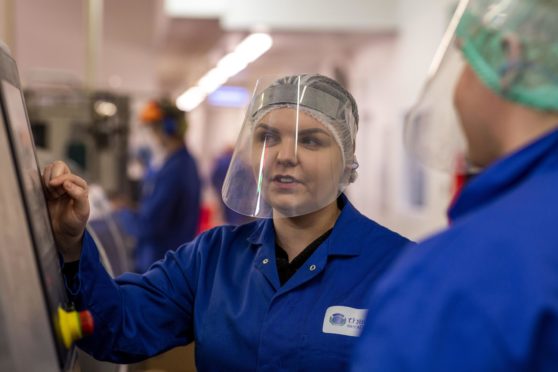There’s lots to be said about moving to a new industry midcareer – you have established experiences and skills that might be relevant. But it can be a steep learning curve as you adjust to different rules
and ways of working.
Entering an industry like seafood on the bottom rung of the ladder can be a real benefit when it comes to developing your career in a new direction because there is lots to learn and unlimited ways to go.
Ryan Scatterly, chairman of the Scottish Seafood Association executive board, said: “There are so many ways to become part of the industry at entry level and work your way up.
“It can be ideal for someone leaving school and looking for the first step in their career, or someone returning to work after time off, or someone changing careers entirely.”
Change of plans
Natasa Kusina never planned to stay in seafood when she got a job on the factory floor of Thistle Seafoods in 2006.
“I wanted a way to make money while I was studying,” the factory technical manager explained, “but I was offered a different position after showing I could do well.
“And from there I kept progressing and showing I was capable and now, 15 years later, it’s felt like the time has flown by!”
For Natasa, the prospect of making money soon gave way to developing her career.
“I always thought I’d end up working in an office but, as I was promoted, I was given the chance to build up my knowledge and feel valued and I really like my work so my plans changed.”
Rewarding potential
Ciaran O’Brien started with International Fish Canners/Nor-Sea Foods after gaining qualifications in the plumbing trade, and soon found his way rising through the ranks.
“I started packing on the line and within a few months I was a team leader.
“Then a few months after that I got the chance to be a trainee shift manager, which led to a shift manager role, before my current role as factory production manager.
“Coming in at entry level allowed my bosses to watch me and see my potential and it allowed me to be in the right place at the right time to get these opportunities.”
Starting over
Lucy Wilkie’s plan had always been to go into the oil and gas sector, and she’d started building a career in that area when she was made redundant.
“Although I’ve lived north of Aberdeen all my life, I’d had no idea about the seafood industry,” she admitted.
“But when a recruiter contacted me about a job at Thistle Seafoods I took the chance to move industries and learn something from scratch.”
As a newbie to seafood, Lucy has used starting at entry level as a purchase ledger administrator to soak up everything she can, so that when the time comes to take the next step in her career she has the necessary knowledge.
Her colleagues have been especially helpful.
She said: “Everyone at Thistle seems to have progressed within the company so I can see for myself that you can do anything.
“It also has a real sense of family values, and there’s nobody who I feel I can’t ask questions or approach because everyone is really friendly.”
Lots of opportunities
More than 8,400 people in Scotland work in the seafood industry in a diverse range of roles spanning food processing and technology, HR, marketing, commercial and engineering.
SSA chief executive Jimmy Buchan said: “There are positions and opportunities for all skills and levels of experience, it’s not too narrow a skillset that’s required, and previous experience isn’t always needed.”
So if you are looking for a new job in an industry that offers good pay, great opportunities and beautiful locations, pay a visit to the Sea A Bright Future website to find out more.


